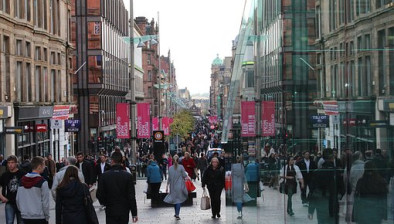SRC & KPMG: Easter provided slender uptick to Scottish retail sales

Easter lifted Scottish retail sales in April, as total sales in Scotland rose by 9.1% compared with April 2022, according to the latest Scottish Retail Consortium (SRC) and KPMG Scottish Retail Sales Monitor.
The total sales figure was s above the 3-month average increase of 8.9% and the 12-month average growth of 7.1%. Adjusted for inflation, the year-on-year growth was 0.3%.
Scottish sales increased by 6.2% on a Like-for-like basis compared with April 2022, when they had increased by 12.7%. This is the same as the 3-month average increase of 6.2% and above the 12-month average growth of 4.9%.
The monitor found that Total Food sales increased by 15.4% versus April 2022, when they had increased by 2.9%. April was above the 3-month average growth of 14.3% and the 12-month average growth of 9.9%. The 3-month average was above the UK level of 9.8%.
Total Non-Food sales increased by 3.9% in April compared with April 2022, when they had increased by 25.7%. This was below the 3-month average increase of 4.4% and the 12-month average of 4.8%.
Adjusted for the estimated effect of Online sales, Total Non-Food sales increased by 2.5% in April versus April 2022, when they had increased by 18.8%. This is below the 3-month average growth of 3.3% and the 12-month average of 2.9%.
David Lonsdale, director of the SRC, said: “Easter provided a slender but nonetheless welcome uplift to retail sales in Scotland last month. The real terms value of retail sales edged back into positive territory, after the decline witnessed in March, driven by health and beauty categories and as people spruced up their homes and gardens.
“However, the figures reveal a continued and indeed more pronounced polarisation of performance between food and non-food categories. With households spending more on groceries due to elevated levels of inflation, the consequences of this can be seen with more discretionary spending areas losing out, with volumes declining. This has been particularly felt in categories such as clothing and footwear, larger furniture, and electricals which have all lost out as a result. That said, there were pockets of demand including for energy saving appliances, gaming consoles, and gardening and DIY.
“Whilst overall inflationary pressures and more specifically food price rises have hopefully crested and will begin to ease, it’s too soon to say whether this will correspond with greater spending on more discretionary retail products. After all, Scotland’s shoppers face several headwinds which may prove hard to shrug off and which could well crimp consumer spending, notably higher council tax and income tax and elevated mortgage rates. This underlines the need for government at both UK and Scottish levels to remain wary about adding yet further pressure on to household finances over the year ahead.”
Paul Martin, partner, UK head of retail at KPMG, added: “Retail sales in Scotland held steady in April with decent growth of 9.1 per cent, but when stacked against a background of higher inflation year-on-year, the figure drops to 0.3 per cent, cancelling out any true growth.
“It was a mixed bag for retailers, with food sales the biggest growth area, aided by the Easter weekend and family gatherings. Noticeably, clothing and footwear sales didn’t perform as strongly as may have been expected at this time of year, which is likely down to a lack of sunny days across the country last month.”
Mr Martin continued: “Consumer demand has so far been fairly resilient to the twin drags of high inflation and high interest rates, but as government energy support comes to an end for many, savings start to dwindle and other household bills rise, it is likely that the next few months will continue to be challenging as the consumer tank empties.
“Much hinges on whether soaring food inflation can be brought under control enough to allow consumers to comfortably start spending again on non-essential items.
“Retailers will be hoping that the Coronation, coupled with a month full of bank holidays and inflation easing, will boost consumer confidence significantly enough to start to see real, profitable growth.”







